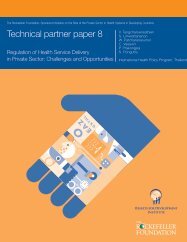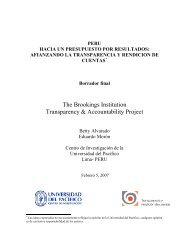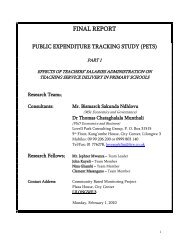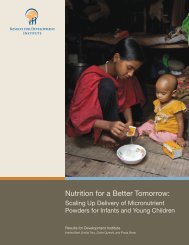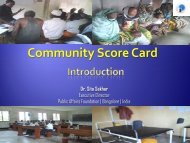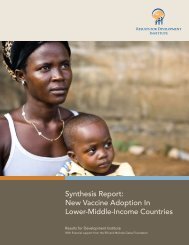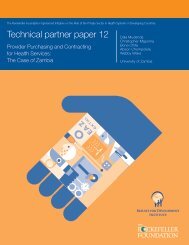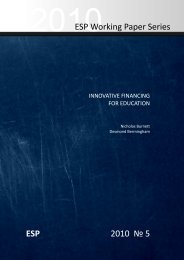Innovative Secondary Education For Skills Enhancement
Innovative Secondary Education For Skills Enhancement
Innovative Secondary Education For Skills Enhancement
Create successful ePaper yourself
Turn your PDF publications into a flip-book with our unique Google optimized e-Paper software.
<strong>For</strong> a school, the principal/school council can make a<br />
choice on how many streams and which stream(s) to<br />
be applied after reporting and getting approval from the<br />
director of the Provincial Department of <strong>Education</strong> and<br />
Training. <strong>For</strong> those schools operating the basic stream,<br />
they may also organize teaching advanced subjects in the<br />
two other streams of natural sciences (and mathematics)<br />
and social sciences and foreign languages in order to<br />
widen the students’ subject selection options. In addition,<br />
the government has set a target to provide Internet access<br />
to more than 90 percent of upper secondary schools during<br />
the next planning period.<br />
Innovations to Transform<br />
Existing Systems<br />
Distance Learning for Vocational<br />
Training (Thailand)<br />
Vocational education and skills development were carried<br />
out in many parts of Thailand through distance learning<br />
programs, especially for schools in rural areas that do not<br />
have qualified teachers. <strong>Innovative</strong> elements of this model<br />
include the following: the best teachers are selected;<br />
teacher manuals and student workbooks are provided<br />
in advance; students can repeat each module when they<br />
want; and cost saving. Key success factors included attitude<br />
toward distance learning of school administrators<br />
and teachers; readiness of teachers and students; wellmaintained<br />
equipment and technical system; and 24-hour<br />
TV programming and Internet. Limitations of the distance<br />
learning programs included problems with electrical<br />
power and the technical system that were not always able<br />
to be resolved promptly.<br />
Innovations through<br />
Multi‐Stakeholder<br />
Partnership<br />
Thailand hosts two public–private partnership models<br />
that draw upon industry expertise to enhance youth learning<br />
and increase employment outcomes. The programs<br />
bring together training institutes and local enterprises to<br />
incorporate on-the-job training into traditional class-based<br />
training, which enhances existing curricula, provides<br />
youth with practical experience, and ultimately creates<br />
opportunity for employment upon completion.<br />
Business Adopted-School<br />
Program (Thailand)<br />
This program supports skills delivery at secondary schools<br />
through cooperation and coordination between schools<br />
and local businesses. Assistance from businesses includes<br />
financial contribution, equipment, staff development, experts,<br />
and other resources that are provided on agreement<br />
between the partners. One school may work with more<br />
than one business, and each business may work with<br />
more than one school. <strong>For</strong> example, the Kanjanapisak<br />
Goldsmith College provides training in goldsmithing and<br />
jewelry making to young students studying at the same<br />
time for academic qualifications.<br />
The program provides a combination of work-based learning,<br />
a competency-based curriculum, and job opportunities<br />
for students. Key success factors of the program are<br />
the active relationship between businesses and schools,<br />
partnerships built on mutual benefit, and providing opportunities<br />
to teachers for training in the workplace.<br />
Industrial-Lead Program (Thailand)<br />
One of the most successful programs in skills development<br />
in secondary education in Thailand is the Industrial<br />
Owner-Led Program designed and organized independently<br />
by the CPall Company. The training is provided by<br />
the Panyapiwat Techno Business School, which developed<br />
a three-year vocational secondary education program for<br />
7-Eleven convenience stores throughout the country. The<br />
curriculum framework and structures are based on Ministry<br />
of <strong>Education</strong> qualifications, but students are given<br />
specific workplace skills training. Students who complete<br />
this program receive a vocational certificate equivalent to<br />
those from other schools.<br />
Work-based learning is emphasized. Students spend three<br />
months in school and another three months in the workplace,<br />
or 7-Eleven convenience stores. Students become<br />
employees on the first day of enrollment in the school.<br />
Students earn income during their practical experiences at<br />
the workplace. An important innovative strategy of this<br />
program is the distance learning program for those students<br />
who enroll at 20 centers and 70 networked schools.<br />
They receive the same quality standard of theory subjects<br />
as those at the school. Practical training is provided by<br />
well-trained and experienced staff at the workplace. This<br />
strategy has increased the number of students to 10,000<br />
instead of only 1,800 at the school only. Key success factors<br />
of this program are an active administrative team and<br />
teachers, continuous improvement of the program, attractive<br />
practical experiences, and concentration of required<br />
attributes for the retail occupation.<br />
56 <strong>Innovative</strong> <strong>Secondary</strong> <strong>Education</strong> <strong>For</strong> <strong>Skills</strong> <strong>Enhancement</strong> (ISESE)





